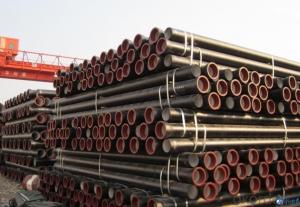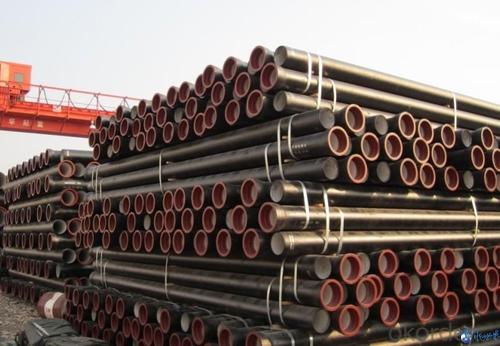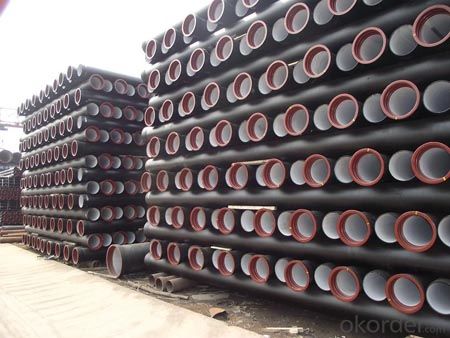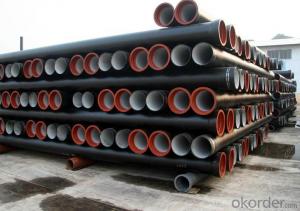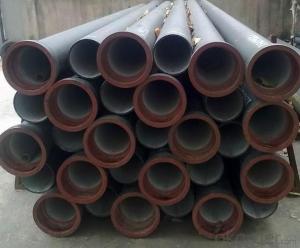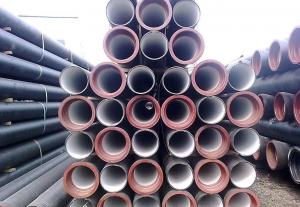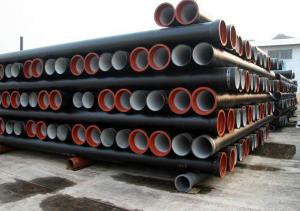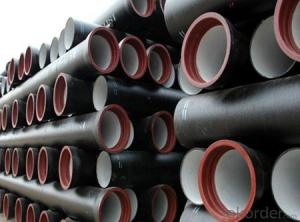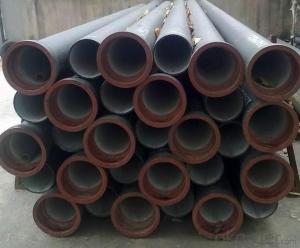Ductile Iron Pipe Cast Iron EN545 DN800
- Loading Port:
- China main port
- Payment Terms:
- TT OR LC
- Min Order Qty:
- 999 m
- Supply Capability:
- 9999 m/month
OKorder Service Pledge
OKorder Financial Service
You Might Also Like
1,Ductile Iron Pipe Description :
1) Pipes confirm to ISO2531,K9 class,T type joint,6m long,with inside cements lining conform to ISO4179, outside Zinc spraying(130g/m2) and bitumen coating(70μm) conform to ISO8179.
2) Pipe ends: Spigot and socket ends, with 100% SBR rubber gaskets accoding to ISO4633
3) we can do third party inspection according to customer's request.
4) Our products have been sold to many international market, such as Middle East and South East Asia and Africa.
2,Main Features of the Ductile Iron Pipe:
1. Material: Ductile iron grade 500-7/ 450-10 in accordance with ISO1083
2. Standard: ISO 2531, EN545, EN598, ANSI, AWWA
3. Certificate: ISO9001, ISO14001, SGS, NSF, WRAS
4. Test: In accordance with ISO 2531 / EN 545 / EN598 and 100% water pressure test
5. Length: 6m or cut into 5.6m, 5.7m, 5.8m
6. Internal Lining: Cement, conform to ISO4179
7. External coating: Zinc + Bitumen, conform to ISO8179
8. Rubber: NBR, SBR, EPDM according to ISO4633 / EN681.1
3,Ductile Iron Pipe Images:
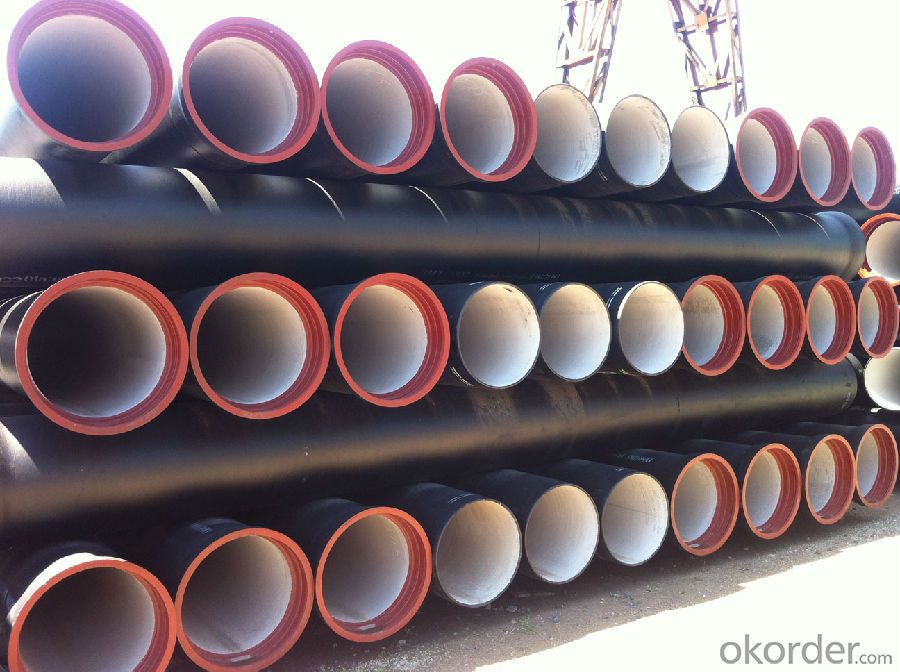
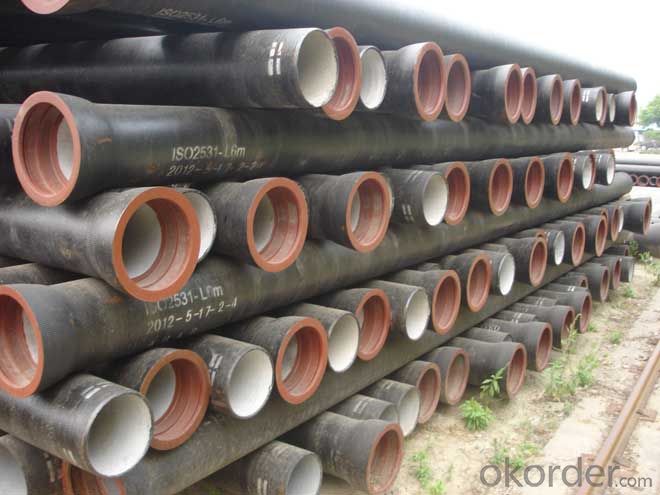
4. Ductile Iron Pipe Specification
Standard: API SPEC 5L 44th eidtion,ASTM A252-98(2007)
Grade: A53 Grades A/B, ASTM A106 Grades B/C,ASTM A179
AWWA, C200, ASTM A139, ASTM A120, API 5L Grade B
X42, X52, X56, X60, X65, X70, X80, X100
Weld Alternatives: LSAW
OD size range: 6.4~44.5mm
Wall thickness: 406.4~1422mm
Length: 3 - 12 m according to requirment
Note: Other grade can also be provided after consulting. Special design are available
for coal slurry conveyance LSAW line tube -- Service
Documentary MTC, material certification,Origin certification, CI or PI,Test Report, export licence, handling order, B/L,insurance policy,shipping instructions, contract, packing list etc.
5.FAQ:
We have organized several common questions for our clients,may help you sincerely:
1.Q: Why would you choose ductile iron pipe rather than other pipe materials?
A:The reasons are obvious for that not only ductile iron pipe possesses the inherent strength and flexibility of ductile iron, combined with proven corrosion protection systems, but also the cost savings can be achieved from design to installation and commissioning.
2.Q:Why can you guarantee the inner of pipes can’t be corroded?
A: High alumina cement mortar lining and sulphate-resistant cement mortar lining. These two special linings are applicable to inner anti-corrosion for sewage pipes, improving resistance to erosion of the sewage components.
- Q: Are ductile iron pipes suitable for horizontal auger boring installations?
- Yes, ductile iron pipes are suitable for horizontal auger boring installations. Ductile iron pipes are known for their strength and durability, making them a reliable choice for various installation methods, including horizontal auger boring. This method involves drilling a horizontal hole underground and then pulling the pipe through the hole. Ductile iron pipes can withstand the forces involved in this process and maintain their structural integrity. Additionally, ductile iron pipes have high resistance to corrosion, which is crucial for underground installations where they may be exposed to moisture and other potentially damaging elements. Overall, ductile iron pipes are a suitable and widely used option for horizontal auger boring installations.
- Q: Are ductile iron pipes suitable for installation in areas with high groundwater salinity?
- Areas with high groundwater salinity are generally suitable for the installation of ductile iron pipes. Ductile iron is renowned for its resistance to corrosion, making it a favored choice for various applications, such as water and wastewater systems. High groundwater salinity refers to the increased presence of dissolved salts in the water. Although this can potentially cause corrosion in certain materials, ductile iron pipes are specifically engineered to withstand such conditions. These pipes are equipped with a protective lining, usually composed of cement mortar or polyurethane, which acts as a barrier between the pipe and its surroundings, including highly saline water. The lining serves to prevent any corrosive effects of the high groundwater salinity on the iron pipe, ensuring its long-lasting durability and reliability. Furthermore, ductile iron pipes possess a high tensile strength, enabling them to endure external loads and pressure, even in demanding environments. It is important to acknowledge that the suitability of ductile iron pipes for areas with high groundwater salinity can also be influenced by factors such as the specific levels of salinity, the presence of other corrosive agents, and the overall design and installation practices. Therefore, it is advisable to consult experts or engineers who are familiar with the local conditions in order to determine the most appropriate materials and precautions for specific installation projects.
- Q: Can ductile iron pipe be used for industrial wastewater applications?
- Yes, ductile iron pipe can be used for industrial wastewater applications. It has excellent strength, durability, and corrosion resistance, making it suitable for handling various types of wastewater in industrial settings. Additionally, ductile iron pipe is known for its ability to withstand high-pressure and high-temperature conditions, making it a reliable choice for industrial wastewater applications.
- Q: Are ductile iron pipes suitable for installation in areas with high groundwater table?
- Yes, ductile iron pipes are suitable for installation in areas with high groundwater table. Ductile iron pipes have excellent corrosion resistance and are highly durable, making them resistant to the corrosive effects of groundwater. Additionally, their strong and flexible nature allows them to withstand external pressure caused by high groundwater levels without compromising their structural integrity.
- Q: How is ductile iron pipe tested for quality?
- Extensive quality testing is carried out on ductile iron pipe to ensure its performance and reliability in various applications. The pipe undergoes a series of steps to assess its physical and mechanical properties. The hydrostatic pressure test is one of the main tests performed on ductile iron pipe. This test involves subjecting the pipe to fluid pressure that exceeds its designed operating pressure. The purpose is to determine if the pipe can withstand internal pressure without any leakage or failure. The pipe is filled with water or another suitable fluid, and the pressure is gradually increased to the required level. During this test, the pipe is carefully inspected for any signs of leakage or deformation. Another essential test is the tensile strength test, which measures the pipe's ability to resist pulling or stretching forces. A sample of the pipe is pulled until it breaks, and the maximum force applied during the test is recorded. This test helps determine important properties such as the pipe's ultimate tensile strength, yield strength, and elongation. The Charpy test is used to assess the pipe's impact resistance. In this test, a notched sample is struck with a swinging pendulum to measure the amount of energy absorbed by the pipe. It helps determine if the pipe can withstand sudden impacts or loads without fracturing. In addition to these tests, the pipe also undergoes various non-destructive tests, including ultrasonic testing, magnetic particle inspection, and visual inspection. These tests are crucial in detecting any internal or external defects, cracks, or abnormalities that could compromise the pipe's structural integrity. Furthermore, chemical analysis and metallographic examination are performed to evaluate the chemical composition and microstructure of the ductile iron pipe. These tests ensure that the pipe meets the necessary specifications and standards for its intended application. Overall, the testing process for ductile iron pipe is thorough and stringent. Its purpose is to guarantee the pipe's quality, durability, and overall performance in safely and efficiently delivering water, wastewater, or other fluids.
- Q: Can ductile iron pipes be used for large-scale irrigation systems?
- Ductile iron pipes are ideal for large-scale irrigation systems due to their strength, durability, and corrosion resistance. They can withstand high pressure and meet the demands of extensive irrigation. Furthermore, these pipes have a long lifespan, minimizing the need for frequent maintenance and replacements. In addition, they are cost-effective when compared to alternative materials used in irrigation systems. Consequently, ductile iron pipes are a prudent choice for large-scale irrigation systems, given their strength, durability, corrosion resistance, and cost-effectiveness.
- Q: Are ductile iron pipes suitable for sewer force mains?
- Yes, ductile iron pipes are suitable for sewer force mains. Ductile iron is a type of cast iron that has a higher level of strength and flexibility compared to traditional cast iron pipes. This makes it ideal for applications where the pipes need to withstand high pressure and heavy loads, such as sewer force mains. Ductile iron pipes have excellent resistance to corrosion and are highly durable, which is crucial for sewer systems that are exposed to various corrosive substances and harsh environments. They also have the ability to absorb vibrations and shocks, reducing the risk of pipe failures caused by external forces. Furthermore, ductile iron pipes are known for their long service life, often lasting for more than 100 years. This makes them a cost-effective choice for sewer force mains, as they require minimal maintenance and replacement over their lifetime. Overall, ductile iron pipes offer a reliable and durable solution for sewer force mains, providing the necessary strength, flexibility, and resistance to corrosion to ensure efficient and long-lasting sewer systems.
- Q: What is the cost of ductile iron pipe compared to other pipe materials?
- The cost of ductile iron pipe can vary depending on factors such as size, length, and project requirements. Generally, ductile iron pipe tends to be more expensive than alternatives like PVC or HDPE pipes. Ductile iron pipe is renowned for its strength and durability, making it suitable for water distribution, wastewater systems, and industrial piping. Its robustness and longevity contribute to its higher cost compared to other materials. In contrast, PVC and HDPE pipes are often more affordable due to lower production and material costs. They are also lightweight, easy to install, and resistant to corrosion, resulting in cost savings during installation and maintenance. While ductile iron pipe may have a higher upfront cost, its superior strength and longevity can lead to long-term savings by reducing the need for frequent repairs or replacements. The choice of pipe material should consider project requirements, budget constraints, and the expected lifespan of the infrastructure.
- Q: Can ductile iron pipes be used for underground cable conduits?
- Ductile iron pipes are well-suited for underground cable conduits. They possess strength, durability, and corrosion resistance, making them suitable for a range of applications, including underground cable conduits. These pipes can handle heavy loads and safeguard cables against external elements. Furthermore, their long lifespan minimizes the need for frequent replacements and maintenance. Nonetheless, it is vital to consider factors like burial depth, soil conditions, and specific cable installation requirements when selecting ductile iron pipes for underground cable conduits.
- Q: Are there any limitations to the length of ductile iron pipe sections?
- Yes, there are limitations to the length of ductile iron pipe sections. The maximum length of ductile iron pipe sections is typically dictated by factors such as transportation limitations, installation requirements, and structural considerations. Additionally, longer pipe sections may be more prone to bending or sagging under their own weight, which can impact the performance and integrity of the pipeline system. Therefore, it is important to adhere to industry standards and guidelines when determining the length of ductile iron pipe sections for a specific application.
Send your message to us
Ductile Iron Pipe Cast Iron EN545 DN800
- Loading Port:
- China main port
- Payment Terms:
- TT OR LC
- Min Order Qty:
- 999 m
- Supply Capability:
- 9999 m/month
OKorder Service Pledge
OKorder Financial Service
Similar products
Hot products
Hot Searches
Related keywords
